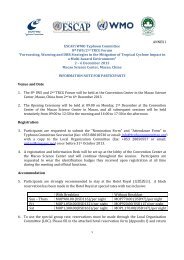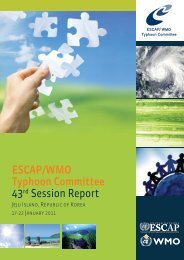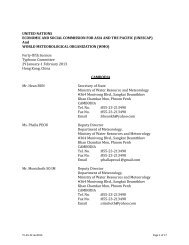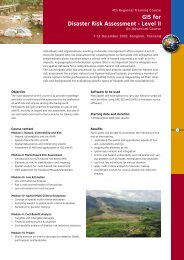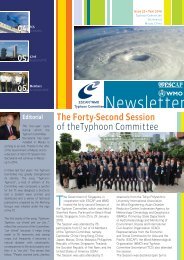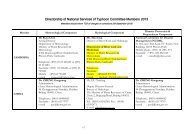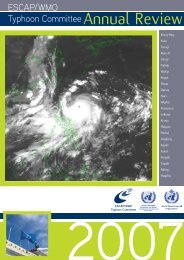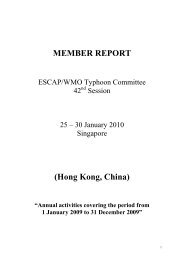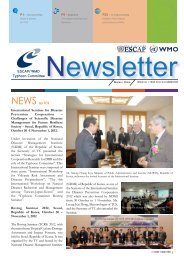TCAR - Typhoon Committee
TCAR - Typhoon Committee
TCAR - Typhoon Committee
Create successful ePaper yourself
Turn your PDF publications into a flip-book with our unique Google optimized e-Paper software.
4.1 Introduction<br />
<strong>TCAR</strong><br />
CHAPTER 4 - WMO TROPICAL CYCLONE NEWS<br />
WMO TROPICAL CYCLONES NEWS 2009<br />
The WMO Tropical Cyclone Programme carries<br />
out its activities in accordance with the guidance<br />
given by the Members through WMO Congress<br />
(Cg) and Executive Council (EC) to achieve the<br />
goals of the WMO Strategic Plan. The resolutions<br />
and decisions at the EC session in the reference<br />
year with particular relevance to the Programme<br />
are highlighted in the following<br />
.The sixty-first session of EC (EC-LXI, Geneva,<br />
June 2009) discussed implementation of the<br />
Tropical Cyclone Programme and provided<br />
guidance under the Expected Results 1, 6 and 9<br />
of the WMO Strategic Plan.<br />
With reference to advances in operational weather<br />
forecasts and warnings, EC-LXI reaffirmed the<br />
use of ensemble techniques including multimodel<br />
consensus forecasting by the national<br />
and regional tropical cyclone warning centres to<br />
further improve the application of NWP to tropical<br />
cyclone forecasting. It also underlined the<br />
dissemination of ensemble-based probabilistic<br />
guidance to improve the representation of forecast<br />
uncertainty which will be especially useful for<br />
disaster risk management in threatened areas. In<br />
this regard, the Council noted with satisfaction that<br />
the Technical Forum for EPS and the operational<br />
system for data processing and display was held<br />
in the Republic of Korea for the forecasters of<br />
<strong>Typhoon</strong> <strong>Committee</strong> members in May 2009. The<br />
Council recognized that such training workshops<br />
facilitate the use of ensemble-based products in<br />
forecaster- and user-friendly forms through a<br />
systematic and optimized approach. The Council<br />
therefore requested the Secretary-General to<br />
give high priority to the organization of such<br />
workshops in other regions for the best use of<br />
those products.<br />
As regards improving forecast of tropical<br />
cyclones and their impacts, the Council noted<br />
that the working environment of tropical cyclone<br />
forecasters has been changing rapidly in many<br />
NMHSs with increased availability of data from<br />
new observational systems as well as forecast<br />
products, including EPS from major NWP centres.<br />
In the meantime, demands are increasing in<br />
diverse user communities for the tropical cyclone<br />
warning service that could be more compliant to<br />
their disaster risk management activities. Given<br />
those circumstances, the Council recognized<br />
the need to enhance support measures for the<br />
forecasters to optimize the efficiency of warning<br />
services and develop operational strategies to<br />
meet the growing demands from the users.<br />
Accordingly, the Council requested the Secretary-<br />
General to revise and update the Global Guide<br />
to Tropical Cyclone Forecasting as early as<br />
possible with due consideration for the newly<br />
emerging requirements. It also underlined that<br />
the new Global Guide be linked to the Tropical<br />
Cyclone Forecaster’s website which will allow<br />
the operational forecasters for easier access to<br />
the up-to-date tools and reference materials for<br />
monitoring and forecasting of tropical cyclone<br />
track and intensity.<br />
Improvements of operational tropical cyclone<br />
forecasting and warning should be based on<br />
advances in research and technical developments<br />
on tropical cyclones. In this connection, the<br />
Council recognized that, while tropical cyclone<br />
forecasts have attained increasing accuracies<br />
in the track forecasting, they still rely heavily<br />
on the research and technology developments<br />
for improvement of forecasting tropical cyclone<br />
intensities, associated heavy rainfall and storm<br />
surge, as well as seasonal frequency of tropical<br />
cyclones. The Council therefore reiterated that<br />
high priority be continuously given to transferring<br />
from R&D into operational use aspects of<br />
forecasting of rapid changes of track and intensity<br />
of tropical cyclones and the impact of associated<br />
hazards during tropical cyclone landfall due<br />
to its significance for disaster prevention. To<br />
focus R&D activities and facilitate the transfer<br />
to operations, the Council encouraged active<br />
interaction between operational forecasters and<br />
researchers as a key to success. Noting that the<br />
research workshops and projects organized by<br />
TCP and WWRP provide excellent opportunities<br />
2009<br />
261



